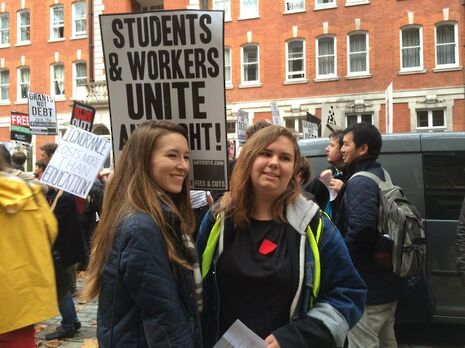CUSU votes to fight against further fee increases
CUSU Council has reaffirmed the organisation’s commitment to free education

CUSU Council has underlined its commitment to free education by voting to lobby the University to prevent further increases in tuition fees. It also voted to support the national demonstration being organised by NUS and UCU in November.
Voting almost unanimously in favour of the motion (with just one abstention), Council tonight resolved to lobby the University not to take part in the second stage of the government’s Teaching Excellence Framework, known as TEF2.
Under proposals currently working their way through parliament, the Teaching Excellence Framework will allow universities that meet certain thresholds of teaching quality – to be determined by a body that as yet hasn't been designated – to raise the fees they charge students in line with inflation.
Following the University’s participation with the first stage of the TEF, fees for Cambridge’s 2017/18 intake will rise to £9,250, with the government having green-lighted the increase over the summer. However, the ability for Cambridge to charge higher fees beyond the 2017/18 academic year rests on whether or not they opt out of TEF2.
Proposing the motion to oppose TEF2, CUSU Education Officer Roberta Huldisch pointed out that the measures being proposed to assess teaching quality “don’t measure anything close to teaching excellence”, singling out graduate earnings as a particularly unhelpful metric when determining the quality of teaching a university offers.
Huldisch also pointed out that a number of other Russell Group universities, including Oxford, have not been so far forthcoming in their support of TEF2, suggesting that vocal opposition of the programme from the student body could sway institutions in the direction of withdrawing from the TEF.
In September, Times Higher Education (THE) reported that Cambridge was one of 16 Russell Group universities that had told them that they were yet to reach a final decision on TEF2 participation.
CUSU will now be compelled to lobby the University not to participate in the second stage of the TEF, which will involve writing an open letter to outline students’ concerns. The motion passed by Council also resolved to “provide information to JCRs, MCRs and the wider student body about opposing TEF”.
Council this evening also voted unanimously in favour of supporting an NUS demonstration in November, which among other things protests hikes in tuition fees. It will also be used to reiterate the national union's commitment to campaigning for free education, something which has long been a CUSU policy as well.
The motion passed by Council resolved to publicise it and provide “support and information to students who want to intend”. CUSU will also make available £340 to hire transport to London, splitting the cost of a coach with Anglia Ruskin University (ARU).
Last November, a coach took about 15 Cambridge and ARU students to a similar rally, the National Demonstration for Free Education.
Presenting the motion to support the demonstration, Emily Dyson pointed to the increases in tuition fees above £9,000, calling it and other moves made by the government, such as the scrapping of maintenance grants, “local manifestations of a far broader marketisation of higher education.”
“It is important that CUSU and the student body be seen to be doing all it can”, Dyson went on to say, saying that the fact that the UCU, which represents lecturers and academics, are supporting the demonstration shows the seriousness of the issues being protested.
 News / Uni Scout and Guide Club affirms trans inclusion 12 December 2025
News / Uni Scout and Guide Club affirms trans inclusion 12 December 2025 News / Pembroke to convert listed office building into accom9 December 2025
News / Pembroke to convert listed office building into accom9 December 2025 Features / Searching for community in queer Cambridge10 December 2025
Features / Searching for community in queer Cambridge10 December 2025 News / Uni redundancy consultation ‘falls short of legal duties’, unions say6 December 2025
News / Uni redundancy consultation ‘falls short of legal duties’, unions say6 December 2025 News / Gov declares £31m bus investment for Cambridge8 December 2025
News / Gov declares £31m bus investment for Cambridge8 December 2025








